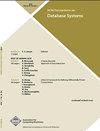Model Counting Meets F0 Estimation
IF 2.2
2区 计算机科学
Q3 COMPUTER SCIENCE, INFORMATION SYSTEMS
引用次数: 0
Abstract
Constraint satisfaction problems (CSPs) and data stream models are two powerful abstractions to capture a wide variety of problems arising in different domains of computer science. Developments in the two communities have mostly occurred independently and with little interaction between them. In this work, we seek to investigate whether bridging the seeming communication gap between the two communities may pave the way to richer fundamental insights. To this end, we focus on two foundational problems: model counting for CSP’s and computation of zeroth frequency moments (F0) for data streams. Our investigations lead us to observe a striking similarity in the core techniques employed in the algorithmic frameworks that have evolved separately for model counting and F0 computation. We design a recipe for translating algorithms developed for F0 estimation to model counting, resulting in new algorithms for model counting. We also provide a recipe for transforming sampling algorithm over streams to constraint sampling algorithms. We then observe that algorithms in the context of distributed streaming can be transformed into distributed algorithms for model counting. We next turn our attention to viewing streaming from the lens of counting and show that framing F0 estimation as a special case of #DNF counting allows us to obtain a general recipe for a rich class of streaming problems, which had been subjected to case-specific analysis in prior works. In particular, our view yields an algorithm for multidimensional range efficient F0 estimation with a simpler analysis.模型计数满足F0估计
约束满足问题(CSP)和数据流模型是两个强大的抽象概念,可以捕捉计算机科学不同领域中出现的各种问题。这两个社区的事态发展大多是独立发生的,它们之间几乎没有互动。在这项工作中,我们试图调查弥合两个社区之间看似沟通的差距是否可以为更丰富的基本见解铺平道路。为此,我们关注两个基本问题:CSP的模型计数和数据流的零频率矩(F0)的计算。我们的研究使我们观察到,在分别为模型计数和F0计算发展的算法框架中使用的核心技术有着惊人的相似性。我们设计了一个配方,用于将为F0估计开发的算法转换为模型计数,从而产生新的模型计数算法。我们还提供了将流上的采样算法转换为约束采样算法的配方。然后我们观察到,分布式流上下文中的算法可以转换为用于模型计数的分布式算法。接下来,我们将注意力转向从计数的角度来看流,并表明将F0估计框定为#DNF计数的特殊情况,可以使我们获得一类丰富的流问题的通用配方,这些问题在以前的工作中已经过具体案例的分析。特别地,我们的观点产生了一种具有更简单分析的多维范围有效F0估计算法。
本文章由计算机程序翻译,如有差异,请以英文原文为准。
求助全文
约1分钟内获得全文
求助全文
来源期刊

ACM Transactions on Database Systems
工程技术-计算机:软件工程
CiteScore
5.60
自引率
0.00%
发文量
15
审稿时长
>12 weeks
期刊介绍:
Heavily used in both academic and corporate R&D settings, ACM Transactions on Database Systems (TODS) is a key publication for computer scientists working in data abstraction, data modeling, and designing data management systems. Topics include storage and retrieval, transaction management, distributed and federated databases, semantics of data, intelligent databases, and operations and algorithms relating to these areas. In this rapidly changing field, TODS provides insights into the thoughts of the best minds in database R&D.
 求助内容:
求助内容: 应助结果提醒方式:
应助结果提醒方式:


